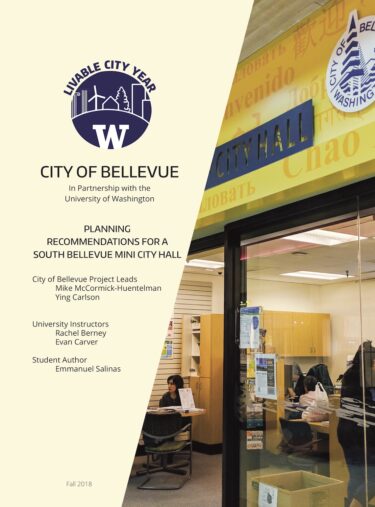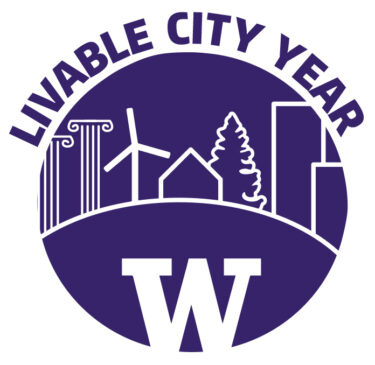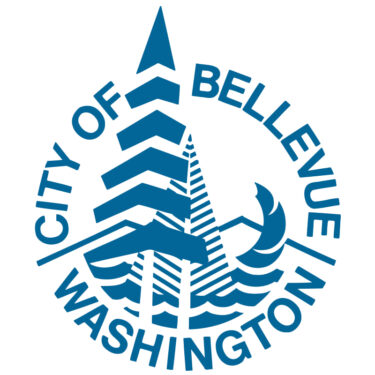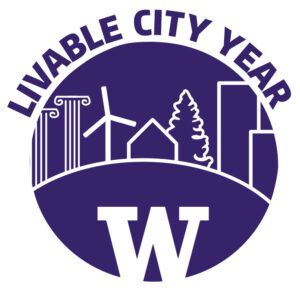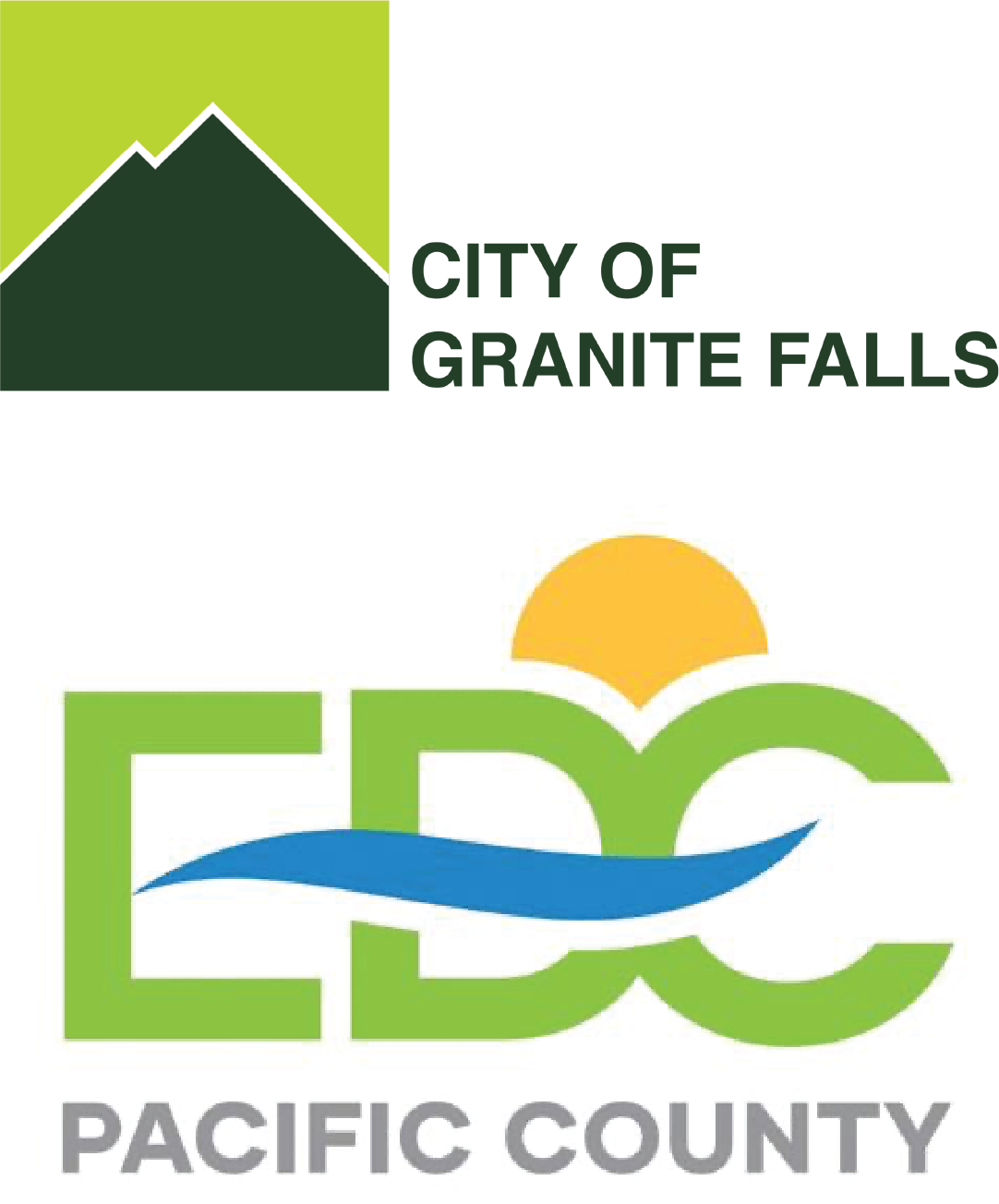Planning Recommendations for a South Bellevue Mini City Hall
2018-2019 Livable City Year – Bellevue
City Project Lead: Mike McCormick-Huentelman, Ying Carlson, Community Development
UW Instructor: Rachel Berney, Evan Carver, Community, Environment, and Planning
Course: CEP 460 Planning in Context
Project description:
Livable City Year (LCY) is a program operated out of the University of Washington (UW). The program partners with cities from across the Puget Sound region, contracting with one each year and coordinating a host of projects, bringing together faculty and students from diverse departments and programs of the UW and various project leads from the city-partner. Students address problems and goals as they are pronounced by city- partners and as they relate to livability themes. During the 2018-2019 Academic Year, the UW is partnering with the City of Bellevue. This final report represents the work of students from the UW Community, Environment, and Planning (CEP) major. Students pursuing this major were tasked with different LCY projects, whose themes ranged from trail oriented development to neighborhood planning and walkability. This particular project grapples with the proposed new Mini City Hall for South Bellevue.
The City tasked our team of five students with finding a location and determining a set of services for a new Mini City Hall to serve the residents of South Bellevue. This new Mini City Hall would not replace the existing one, but rather supplement it, offering the same services, as well as new ones tailored to the South Bellevue community. The current Mini City Hall, located at the Crossroads Shopping Mall, has existed for more than 20 years and has helped those who are less familiar with how government works. Mini City Hall at Crossroads currently provides information and referral services in multiple languages, utilities payment services, and legal assistance referrals. Bellevue’s existing Mini City Hall partners with a variety of community organizations, like International Community Health Services (ICHS), that provide culturally and linguistically appropriate health services.
As a preliminary step in our work, we reviewed case studies from across the country. This enabled us to view what makes other satellite city halls successful, as well as pitfalls to avoid. We also researched the demographics of South Bellevue. This allowed us to tailor recommendations to the area. Next, we distributed a pair of surveys, one to the Mini City Hall staff and another to South Bellevue residents. We hoped to learn from staff respondents: how they learned about Mini City Hall, how they commuted to work there, if they had any concerns about the site’s location, about the demographics of volunteers, and what advice they would offer creators of a new Mini City Hall in South Bellevue. We used the residential survey to gauge interests and desires of residents related to forming a new Mini City Hall in South Bellevue.
In order to find the best location in South Bellevue, we needed to identify key characteristics of a good location. To do this, we created a location matrix. One of the most important assets we considered was whether a site functioned as a social gathering space, or third place, and its accessibility from an array of transportation modes (walking, bicycling, and riding the bus). After creating and reviewing the location matrix, we visited seven sites around South Bellevue: Bellevue College, Eastgate Park and Ride, Eastgate Plaza, Factoria Mall, Newport Hills Shopping Center, Newport Way Library, and South Bellevue Community Center. After conducting interviews with staff from these locations, we made a final decision about where to recommend the City of Bellevue locate its new facility.
SUMMARY OF FINAL RECOMMENDATIONS
We recommend that the City select one of the several vacant storefronts inside the Factoria Mall. The location functions as a third place and is easy to access via all modes of transportation. Furthermore, we recommend that a new Mini City Hall have a private room for residents to receive assistance on personal and sensitive matters out of view of others, and that it provided multilingual and health services like the existing Mini City Hall does. Based on the results of the resident survey, parks and recreation information (e.g., information about YMCA programs), and a permitting center that offers the same services as the Permit Center at the main City Hall (e.g., assistance completing permit applications, information related to zoning) could also be offered out of a new Mini City Hall.
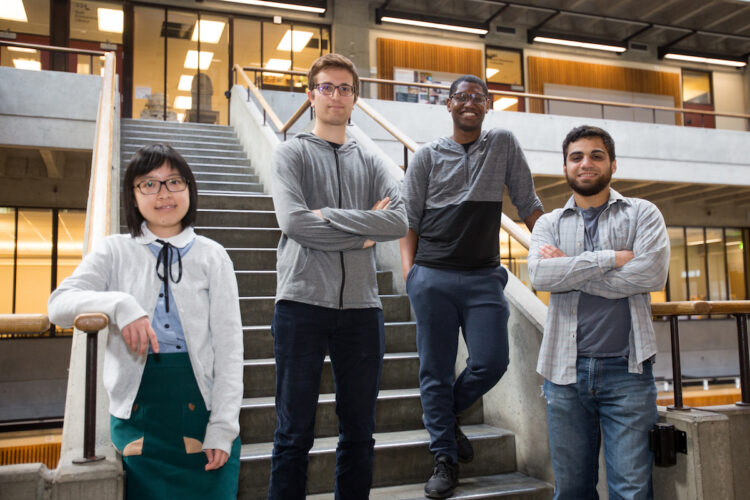
The student team in Gould Hall, from left to right: Vivian Chan, Oskar Abian, Nyles Green, and Emmanuel Salinas (not pictured: Iliana Gutierrez)
Part of the 2018-2019 Livable City Year partnership between the University of Washington and the City of Bellevue.
See all Livable City Year projects in Bellevue that UW students and faculty worked on during the year-long partnership.
